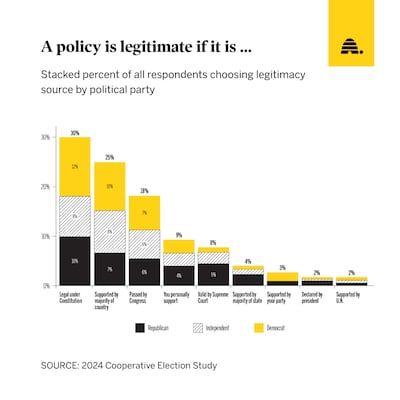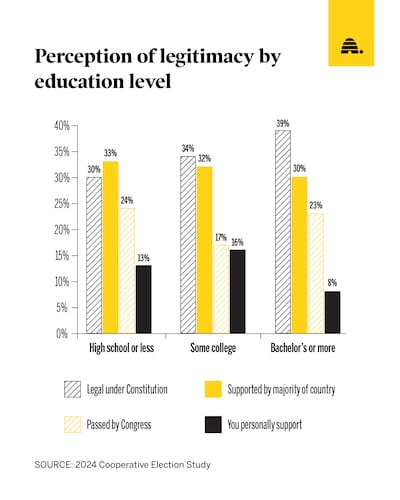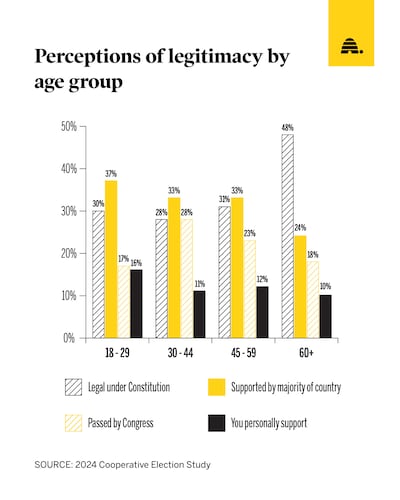- Americans across political lines tend to see the Constitution, U.S. majority support and Congressional vote as the primary sources of legitimacy for a government policy.
- But when age is taken into account, it’s clear that older generations are significantly more likely to look to the Constitution as a source of legitimacy.
- For younger generations, they are equally likely to see majority support or their own personal agreement as a source of legitimacy compared with the constitution.
- The exception to this are relatively younger people with more education, who tend to think less of their own agreement and see the Constitution more favorably.
- Younger Americans now see government legitimacy as more subjective and personalized — rather than anchored in institutional or historic norms.
What gives the American government the legitimate right to act? Is it the Constitution? The will of the people? A vote in Congress? Or something more personal — like whether you personally support the decision?
We wanted to dig into how Americans actually think about these questions. Using data from the 2024 Cooperative Election Study, we asked 1,000 Americans which of nine sources they believe makes a U.S. government policy legitimate — from personal opinion and support from Congress, to constitutional legitimacy or even backing from the United Nations (not such a popular answer it turns out).
The Constitution prevails — but only barely. That was the top answer across surveyed Americans overall, closely followed by support from a majority of the country and then passage through Congress. But this is a perspective that appears to be slowly dying.
Because once you look beyond the toplines and start slicing the data by age and education, something fascinating — and a little unsettling — emerges: Americans are losing their shared sense of what makes a government action legitimate.

The chart above summarizes what we found, breaking down who selected each legitimacy source by their partisanship. At first glance, the country looks surprisingly united. Democrats, Republicans and independents all seem to share similar views on legitimacy, with the Constitution, support from the majority of the country and passage by Congress the three most popular sources of legitimacy across all three parties.
It should give us hope that despite the daily brawls in the news cycle, partisanship doesn’t appear to significantly affect how Americans view basic facts about legitimacy.
But that surface calm conceals deep change. When we look at age and education, the agreement quickly disappears.

For Americans with the most years of education, the Constitution stands tall: nearly 10% more cite it as the basis for legitimacy than any other source. But drop down to those with only a high school diploma, and the picture flips. Support from the majority of the country overtakes the Constitution by a few percentage points, with Congressional approval also making its strongest showing.
This may not be so terrible. Majority support for a proposal is a baseline attribute of good government, but we must remember that the Constitution puts certain things beyond the reach of a majority. For the more educated, that distinction between popularity and constitutional legitimacy matters — with the Constitution more likely to be accepted as the final word.

Age tells an even more striking part of the story. Among Americans aged 60 and over, nearly half (5 in 10) pick the Constitution as the ultimate source of legitimacy. Support from the majority trails far behind at just 24%, and personal preference barely registers. This group shows something we rarely see in politics today: consensus.
Pivoting to the 45–59 age group, we see far less attachment to the Constitution. In fact, a separate analysis that combines age and education, not displayed here, demonstrates another clear trend: education sorts people into different legitimacy camps, even within age groups.
For instance, those in the 45-59 age group with a college education typically choose the Constitution as the key source of legitimacy (38%). But that number drops to just 6% among those in the same age cohort with a high school education or less. Among the least educated middle-age respondents, the top pick was support from the majority of Americans — at 36%.
Education appears to be a gateway to constitutional loyalty for the middle-aged, unlike the older generation, where the Constitution dominates across all education levels
Then come the millennials and Gen Z — and with them, a paradigm shift. In the youngest cohorts, no clear source of legitimacy wins out, with support from the majority edging out the Constitution, just barely. Congressional approval and personal support for a policy also make strong showings.
Legitimacy, for younger Americans, is no longer anchored in shared institutions. It’s individualized, fluid and shaped as much by subjective judgment as by civic tradition.
These findings hint at a generational transformation in how Americans relate to political legitimacy. Older Americans are unified in their faith in the Constitution. Middle-aged Americans are split by education, sorted into different legitimacy frameworks. And younger Americans are divided and diverse, with no dominant view and increasing weight placed on personal belief and public opinion.
Although younger Americans are less likely to see the Constitution as sacred, that doesn’t necessarily mean they reject it. But they do seem to question the very idea that legitimacy must come from fixed, formal institutions like the Constitution.
If this shift continues, future leaders may struggle to justify their actions using traditional sources of authority. Instead, legitimacy may be judged by whether policies resonate with democratic majorities — or even just individual values.
That’s a massive cultural shift. Historically, when societies lose agreement on what makes government legitimate, political turmoil often follows. Arguments escalate. Trust erodes. Revolutions become possible.
All this being said, the absence of stark partisan divides in this data should give us some comfort. Americans from both parties still broadly agree on legitimacy sources, which is no small thing in such a polarized era.
But don’t take too much comfort. Even when Americans generally say they value the Constitution, they interpret it in radically different ways. And among the younger generations, faith in that foundational document is fading fast.
Americans aren’t united by race, religion, geography or language. We are bound by ideas — especially the ones enshrined in the Declaration of Independence and encoded in the Constitution. If legitimacy becomes a matter of personal preference or crowd sentiment, that shared foundation begins to crack.
This is not an argument for blind reverence. It’s a reminder: the Constitution is not just a legal document. It’s the formal adoption of the unbreakable rules. That glue holds us together. And if we want future generations to understand that, it won’t happen by accident. It will require civic education to remind everyone of that fact over and over again. Generations are likely to forget if they are not reminded.
All this is worth reminding people, because if we lose agreement on what makes American government legitimate, we risk losing the ability to govern at all.



